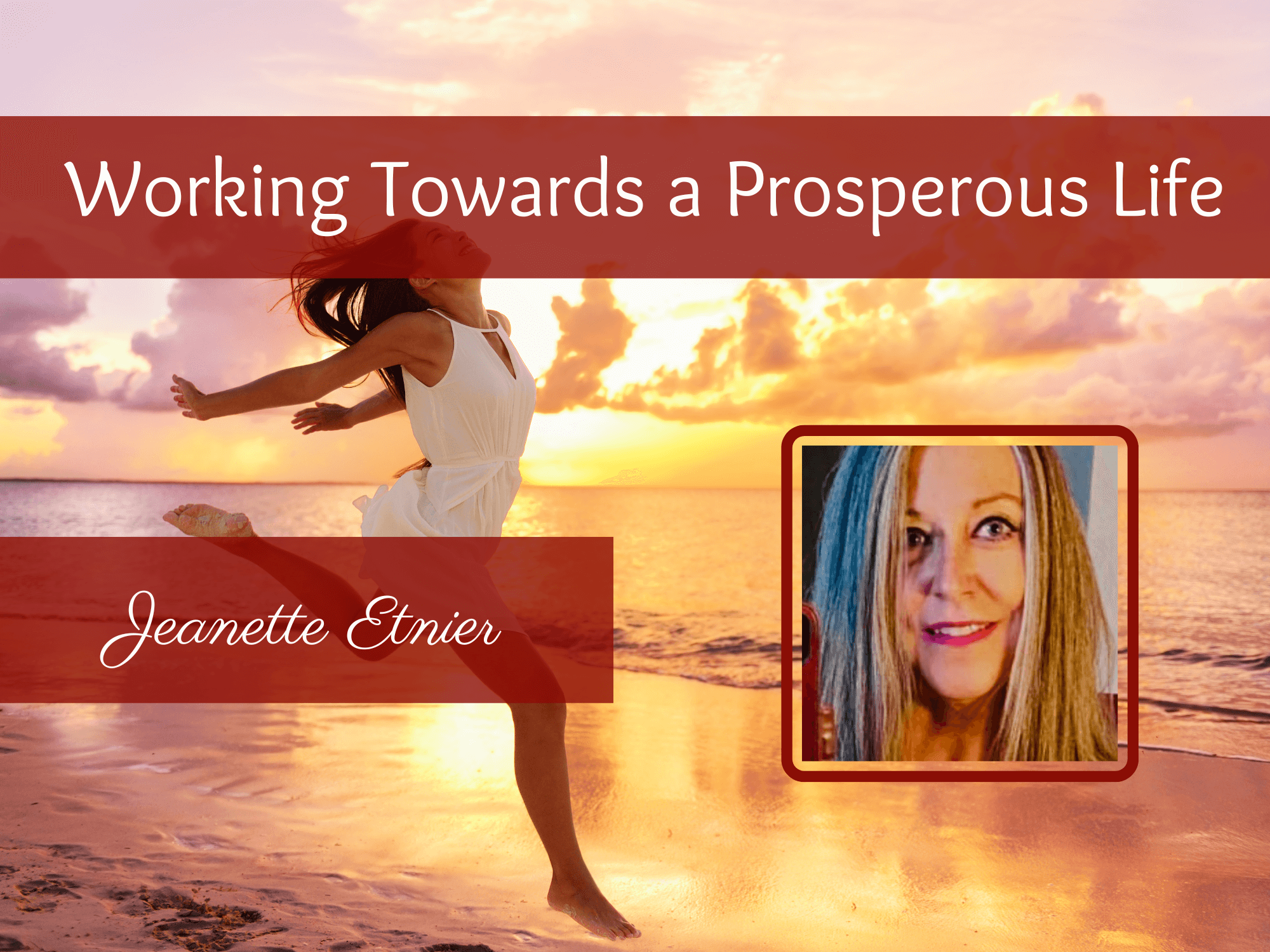“Our creator made us to prosper,” shares Jeanette. The decision to come in for therapy is a monumental moment for a client. They have usually been through a series of experiences that have led them to this pivot toward things that matter most to them in life. It is a brave endeavor.
Most people have had many experiences in their life before making the decision to come in for therapy. It is usually a process. At first, a person might get feedback from a trusted friend or someone they are dating. Often, we listen to their feedback, think it over, and either discard it due to what we interpret as bias, consider some or a piece of the feedback, and move on. The second time we hear the same message from another person who is not associated with the first person who gave us that same feedback, a person may give it more attention and consider it more seriously. The third time, the same feedback is provided by yet another different person from a different place in time and with no association with the other two people.
At this point, most grow more concerned and may decide to come in for therapy. All three of these people often come from very different places in time and have no association with one another. This makes the feedback feel less biased and more reliable to the person receiving it. It is also the kind of feedback they are receiving because it is impacting their ability to perform at their best level in a work situation or within the context of a personal relationship. Every person will come with their own unique experiences and perspectives. Therefore, the algorithm we use to treat a person will be different for every person we see.
Every person has a different experience and a different process. Generally, it is common to see people going through major life transitions, whether job loss/promotion, marriage/divorce or other relationship issues, family dynamics, and/or those battling addictions. Many clients Jeanette works with are going through a significant life transition or multiple life transitions.
In the last several years of specializing in mental health counseling, Jeanette has primarily worked with women struggling with career burnout, divorce, and co-parenting. She says, “I see a lot of women around the ages of 28-32 years old who struggle in their relationships. They are discovering more of what they want for themselves. They are done with merely surviving or settling for the way things have been in their life.“
She jokes that this is usually when the cerebral cortex has fully formed in most adults. “Unfortunately, women are considered a high-risk pregnancy at 36 years of age. So, once our brain is more fully-developed, we only get a few short years to find a person to settle down with and decide to have children with; a somewhat cruel test of fate for a woman, don’t you think!?”
Jeanette can relate to this feeling because, at this age, she decided to switch careers from corporate America to mental health counseling, graduating with her Masters in Clinical Psychology. “I got the MBA in Business Administration for everyone else. Next, I got my Master’s Degree in Clinical Psychology for me. It was a calling that was no longer whispering for my attention but screaming to be heard.” Personal understanding of a client’s struggles has greatly helped Jeanette in her goal to guide her clients to a prosperous life, which she shared with us recently.
Staying Curious and Looking to God
Counselors’ core values play a role in how they work with clients. For Jeanette, learning, staying curious, and her faith in God. “We are to be refined by our experiences, not defined by them.”
Learning
Jeanette values learning, and she craves opportunities to learn new ideas. She describes herself as having a “young brain” that’s always asking for more. “I got into this field because I love learning new things.” Mental health counseling is perfect for her because it’s never boring, and “there are always new advancements to learn about in our field, whether it’s from client experiences, research articles, or additional training.”
Staying Curious
When Jeanette thinks of curiosity, she thinks of Santiago in the book called, “The Alchemist.” She explains, “The main character, Santiago, desires to travel in lieu of relenting to another career. He learns so many life lessons along the way. Just because curiosity can be messy at times does not mean it should be avoided. Life is an adventure. We learn from our failures and our successes. This is why colleges such as Harvard have been known to seek out those who have life experience and give credit for that.”
Often, you will find Jeanette with journal articles around her office, new books, and anything new coming out about something she wants to learn, but equally important are life experiences. As a result, you will find Jeanette spending time with others in her family and community. These core values of learning and curiosity give her the tools to connect with and assist her clients in their unique situations. “If I am not living my life, how can I help others who are,” she shares.
Jeanette continues, “In generations past, curiosity was not always encouraged. Outdated messages that children should be seen and not heard; should obey and not ask so many questions to the extent of not allowing for exploration and adventure thwarted the development of curiosity which is key to learning.”
Dr. Judy Willis, MD, a neuroscientist, found that curiosity can improve learning by stimulating the brain’s reward system. When children are appropriately and safely allowed to explore and discover, this enhances learning.
“I hope and pray I will never know a day when I am no longer curious lest I stop learning!”
Faith in God
Jeanette believes all good things come through His grace and mercy. If it had not been for her belief in God and her relationship with Him, she believes she wouldn’t have made it through the challenges life has thrown at her. Acceptance and Commitment Therapy addresses this as there are just some things we cannot control, and we must find ways to let those go. “I love the serenity prayer for this reason and believe we could all benefit from living by the 12 Steps.” Although, she says, “I respect and appreciate all the many different ways that we believe in love and find ourselves in our respective higher power.” Your belief in a higher power is one of the first things Jeanette wants to learn about you; your core beliefs have much to do with your values and standards and how you go together in therapy.

Jeanette’s Goals for Clients in Therapy
Therapy is not an easy process. There are no “quick fixes” to unique problems one faces. Jeanette has found many female clients struggling with a lack of resources, health issues, limited intellectual abilities, and economic challenges that put them in a depressive or anxious state.
However, hope isn’t lost. “The good news about a good challenge is from point A to point B, and all through the middle, you’re developing the coping skills you need to develop and make your way through it. When you get to the other side, you see how much wiser and stronger you are than people who’ve never had a challenge like that,” Jeanette encourages. There is always a bright side to every situation. Jeanette believes God is looking out for us and cheering us on. There is a way to get through any challenge we face.
Jeanette’s goal in working with her clients is to help her clients live a prosperous life. She explains, “As a Christian, you know God wants His people to prosper. I want [my clients] to prosper, and when I think of prosper, I think of a life well-lived. I want my clients to have all the tools they need to have that prosperous life. I want them to be fulfilled in a way that allows them to have the highest quality of life possible and prosper in as many ways as possible.”
Jeanette can provide the tools and resources to her clients, but 80-90% of the progress in therapy happens outside the office. You take the information and knowledge you learn in the hour of therapy and consciously choose to implement it in your life.

Small Successes = Big Successes
Jeanette is proud of all the progress her clients make in therapy, but specifically, she’s most impressed by those who have very few resources and support. They are up against health challenges, the economy, and a lack of resources and support but still muster up the strength to do whatever it takes to get the help they need.
Sometimes people expect therapy to work quickly or to be prescribed a magic medicine that will make their problems disappear. That just isn’t how it works. Jeanette wants you to know that therapy is a process. In each session, it’s uncertain what memories or feelings will come up, and Jeanette’s job is to help you work through those emotions. The brain is complex and deserves to be explored to help you live a prosperous life.
You aren’t alone if you feel unfulfilled in your career, relationships, or spiritually. Therapy is a great place to start working through those emotions and making a game plan for moving toward a prosperous life. When you’re ready to start living the life you are meant to, we are here for you.
“Do not conform to the pattern of this world, but be transformed by the renewing of your mind. Then you will be able to test and approve what God’s will is – his good, pleasing and perfect will.”
– Romans 12:2

